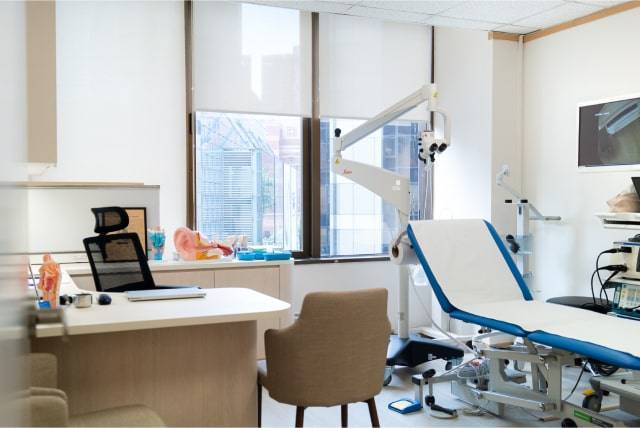Functional Endoscopic Sinus Surgery

What is Functional Endoscopic Sinus Surgery?
Functional endoscopic sinus surgery (FESS) is a minimally invasive treatment designed to treat recurring or chronic sinus infections, abnormal tissue growth in the nose (nasal polyps), and eliminate tumours. The sinuses are hollow spaces in the skull near the nose that can become inflamed or infected, leading to symptoms like congestion, difficulty breathing, a runny nose, and facial pain.
During FESS, ENT surgeons use thin, flexible tubes with lights and lenses known as nasal endoscopes to view and treat the sinuses. This approach helps relieve symptoms without the need for external cuts or incisions. The surgery can typically be performed on a day-surgery procedure basis, allowing patients to leave the hospital the same day and resume routine activities shortly afterwards.

An ENT specialist in Singapore might recommend FESS if you have chronic sinus inflammation or persistent sinus infections that haven’t improved with other treatments like antibiotics or allergy medications. Additionally, this procedure may also be recommended to patients who have nasal polyps (painless, noncancerous growths that form in the nose).
How does a Sinus Specialist in Singapore Diagnose Sinusitis?
In Singapore, standard diagnostic procedures for sinus issues begin with a comprehensive physical examination and review of the patient’s medical history, followed by a series of appropriate tests. During the physical examination, the sinus specialist will often check for common symptoms, such as tenderness in the nose and face and look for any swelling inside the nasal passages.

Subsequently, the sinus specialist may carry out one of the following tests to further evaluate your sinus condition:
- Nasal Endoscopy: A flexible, thin tube with an attached fibre-optic light is used to examine the inside of the nose and sinuses.
- Imaging Tests: Imaging exams such as an MRI or CT scan can help detect any blockages or structural issues that may be causing sinusitis.
- Allergy Testing: Allergy tests may be conducted to identify potential triggers for the patient’s sinus issues, particularly in cases of chronic sinusitis.
Based on the diagnostic results, an ENT specialist can then recommend a suitable treatment plan for the patient’s unique condition, which includes surgery.
Who can perform Functional Endoscopic Sinus Surgeries?
In Singapore, FESS is typically performed by a nose specialist known as an otolaryngologist or ENT (Ear, Nose, and Throat) surgeon. This surgery requires the expertise of an ENT specialist in the anatomy and function of the nasal and sinus passages.
You can visit an ENT centre to find a sinus specialist in Singapore for FESS. At Aglow ENT Centre, Dr Ker Liang is an experienced ENT surgeon who upholds a compassionate and personalised approach to each of her patients.
What to Expect
Given the minimally invasive nature of FESS, patients can expect the procedure to last between 1 to 3 hours, with straightforward preparations guided by the specialist beforehand, including:
- Assessing whether you are suitable for the procedure
- Adjusting your medication as needed, as some may impact the procedure
- Recommending that you refrain from smoking for at least 2 weeks before the surgery
Before the Surgery
Depending on the surgeon’s assessment, a patient may be placed under general or local anaesthesia before the sinus operation.
During the Surgery
The general step-by-step of a FESS involves:
- The ENT surgeon inserts an endoscope, equipped with a camera, into the nose. This allows the surgeon to visualise the inside of the nasal cavity and sinuses.
- Using another set of small instruments, the surgeon will then carry out necessary steps, which may include
- Ethmoidectomy: This procedure clears the blocked sinuses (located near the nose and eyes) to help improve drainage and reduce sinus infections.
- Maxillary Antrostomy: The surgeon removes blockages in the maxillary sinuses (located in the cheek area) to allow fluid to drain more easily, helping prevent future sinus problems.
- Septoplasty with Turbinoplasty: This surgery straightens a crooked septum (wall between the two sides of the nasal cavity) and reduces swollen nasal turbinates (bony structures) to open up the nasal passages, improving breathing and drainage.
- Any pus or polyps in the sinus are cleared using the widened openings, and the sinus cavities are rinsed with saline.
- Finally, appropriate dressings are placed in the sinus cavity to aid in the healing of the sinus linings.
After the Surgery
Patients will recover in a dedicated room after the surgery before being discharged. In most cases, patients can leave on the same day. However, depending on the patient’s condition, the doctor may recommend an overnight stay.
What is the Success Rate of a FESS Surgery?
The success rate of FESS is generally high but varies according to individuals. Most patients who have undergone this surgery report relief from their sinus problems, indicating its effectiveness. FESS aims to achieve the following outcomes:
- Alleviation of Chronic Symptoms:
Patients often experience significant relief from nasal congestion, facial pressure, headaches, and post-nasal drip, increasing the quality of life and reducing the need for medication. - Enhanced Sinus Drainage and Airflow:
FESS clears sinus obstructions, enhancing drainage and reducing mucus and bacterial build-up, thereby lowering the risk of sinus infections. - Restored Nasal Function:
FESS addresses sinus blockages, leading to easier breathing, enhanced sense of smell, and reduced reliance on nasal medication. - Minimally Invasive:
Performed through the nostrils without external incisions, FESS offers less pain, minimal scarring, and faster recovery compared to traditional invasive surgery.
At Aglow ENT Centre, our experienced ENT surgeon, Dr Ker Liang, will thoroughly assess your condition to determine if you could benefit from undergoing FESS.
Schedule a consultation today if you are interested in finding out if this surgery is right for you.
What are the Potential Risks and Complications of a FESS Surgery?
FESS is generally considered safe and effective for treating chronic sinusitis and other related conditions. However, like any surgical procedure, it carries some risks. Some common side effects of FESS include:
- Nasal congestion during the healing period
- Mild bleeding (usually seen when sneezing)
- Nasal discharge
These side effects are typically mild and temporary and usually resolve on their own. Typically, a FESS procedure would not result in significant complications. Careful preoperative planning and skilled surgical techniques can help minimise these risks.
When is a FESS Surgery Necessary?
FESS is typically recommended when other treatments, like medications and lifestyle changes, don’t improve chronic sinus issues or infections. This surgery may be necessary if you have:
- Chronic sinusitis or inflammation that persists beyond 3 months
- Severe symptoms like facial pain, headaches, nasal congestion, or difficulty breathing
- Nasal polyps
If you are experiencing any of the above symptoms, do consult an ENT specialist for medical advice.
Frequently Asked Questions
How painful is FESS?
The procedure itself is not painful, as patients will be provided anaesthesia. However, patients may experience some discomfort in their nose area during recovery.
Is FESS a viable solution for children?
This surgery is an effective treatment option for children.
What is the recovery time for FESS?
Most patients will be able to return to normal activities within 2 weeks. However, full recovery may vary among patients depending on their individual conditions
Are there any alternatives to FESS?
An assessment by a sinus specialist is required to determine if patients are eligible for balloon sinuplasty, which is another type of sinus surgery in Singapore for less severe cases of sinus issues.
Medical Teaching
Assistant Professor Ker Liang has a passion for teaching and is an Assistant Professor with NUS Yong Loo Lin School of Medicine (YLLSOM). As the NUS-NUH Otolaryngology Department Undergraduate Medical Director, Dr Ker Liang supervises the training of medical students from YLLSOM, NUS. She is actively involved
in the training of postgraduate junior doctors and residents in the Head and Neck Surgery department. She was conferred with an Undergraduate Teaching Award by the National University Health System in 2016 for her outstanding efforts as an Otolaryngology educator.
Medical Teaching
Assistant Professor Ker Liang has a passion for teaching and is an Assistant Professor with NUS Yong Loo Lin School of Medicine (YLLSOM). As the NUS-NUH Otolaryngology Department Undergraduate Medical Director, Dr Ker Liang supervises the training of medical students from YLLSOM, NUS. She is actively involved
in the training of postgraduate junior doctors and residents in the Head and Neck Surgery department. She was conferred with an Undergraduate Teaching Award by the National University Health System in 2016 for her outstanding efforts as an Otolaryngology educator.



